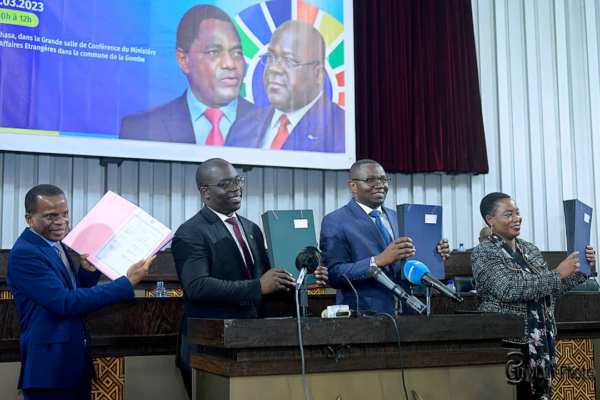African Export-Import Bank (Afreximbank) and the United Nations Economic Commission for Africa (ECA) have signed a Framework Agreement with the Democratic Republic of Congo and the Republic of Zambia for the establishment of Special Economic Zones (SEZ) for the production of Battery Electric Vehicle (BEV) and related services.
Under the terms ratified in the Framework Agreement, Afreximbank and ECA will play a central facilitating role, acting as the Project’s financial and technical partners respectively.
The two institutions will lead the establishment of an Operating Company (OpCo) in consortium with investors (both public and private) from DRC and Zambia, as well as international investors such as Afreximbank’s impact fund subsidiary, the Fund for Export Development in Africa (FEDA). This OpCo will develop SEZs dedicated to the production of battery precursors, batteries, and electric vehicle, in both the DRC and Zambia.
ARISE Integrate Industrial Platform (ARISE IIP), a pan-African infrastructure developer, has been selected as the technical consultant to conduct the pre-feasibility study for the establishment of the SEZs in DRC and Zambia.
The project will deploy well-established and proven EV technology that will enable both countries to exploit their mineral resources at scale. It will accelerate the manufacture of pre-export value added products, enabling them to capture more value within these states and it will result in new demand for skilled engineers with technical expertise, providing a significant boost to local labour markets.
DRC and Zambia are well positioned to establish leadership in the strategically pivotal electric vehicle (EV) sector, being well-endowed with the resources necessary to produce battery minerals. The DRC accounts for approximately 70% of global cobalt supply and 88% of cobalt exports, and the two countries collectively contribute 11% of all copper supply globally. Mining is also a critical sector for both states, contributing 70% of Zambia’s foreign exchange, while cobalt accounts for 26% of the DRC’s exports.
Commenting on the signing of the Framework Agreement, Ms. Oluranti Doherty, Afreximbank’s Director of Export Development, said: “The execution of this framework agreement testifies to a strong commitment by the governments of the DRC and Zambia, Afreximbank and ECA, as well as other partners, to promote inclusive development of the Battery Electric Vehicle value chain, also rendering the DRC and Zambia globally competitive investment destinations. At Afreximbank, we are firmly convinced that Industrial Parks and Special Economic Zones are critical tools the continent can deploy to fast-track its industrial infrastructure development, promote Intra-African Trade, accelerate the implementation of the AfCFTA and facilitate Export Development. This intervention also demonstrates Afreximbank’s commitment to promoting climate finance solutions that will reduce carbon footprints – in alignment with global decarbonization trends and a pan-African narrative around encouraging a just, sustainable, and responsible energy transition.”
For his part, Antonio Pedro, interim Executive Secretary of ECA, hailed the agreement as “an important step in ensuring we have the right enabling policies in place for the region to benefit from the so-called green mineral boom.” Mr. Pedro underscored the agreement’s importance to the implementation of the AfCFTA and the region’s path to achieving sustainable industrialization and economic diversification.
“ECA is proud to be a partner to the governments of DRC and Zambia in support of building a value chain for battery and electric vehicles, and I would like to take this opportunity to reiterate our commitment in supporting you in this endeavour,” he said.
A global transition towards green energy and rapid decarbonization has exponentially increased demand for Electric Vehicles (EVs) as well as investment in battery-powered storage systems. For Afreximbank, this intervention adds to the institution’s climate finance credentials, establishing it as a leading financier to energy transition projects which develop the industrial sophistication of key African markets.



